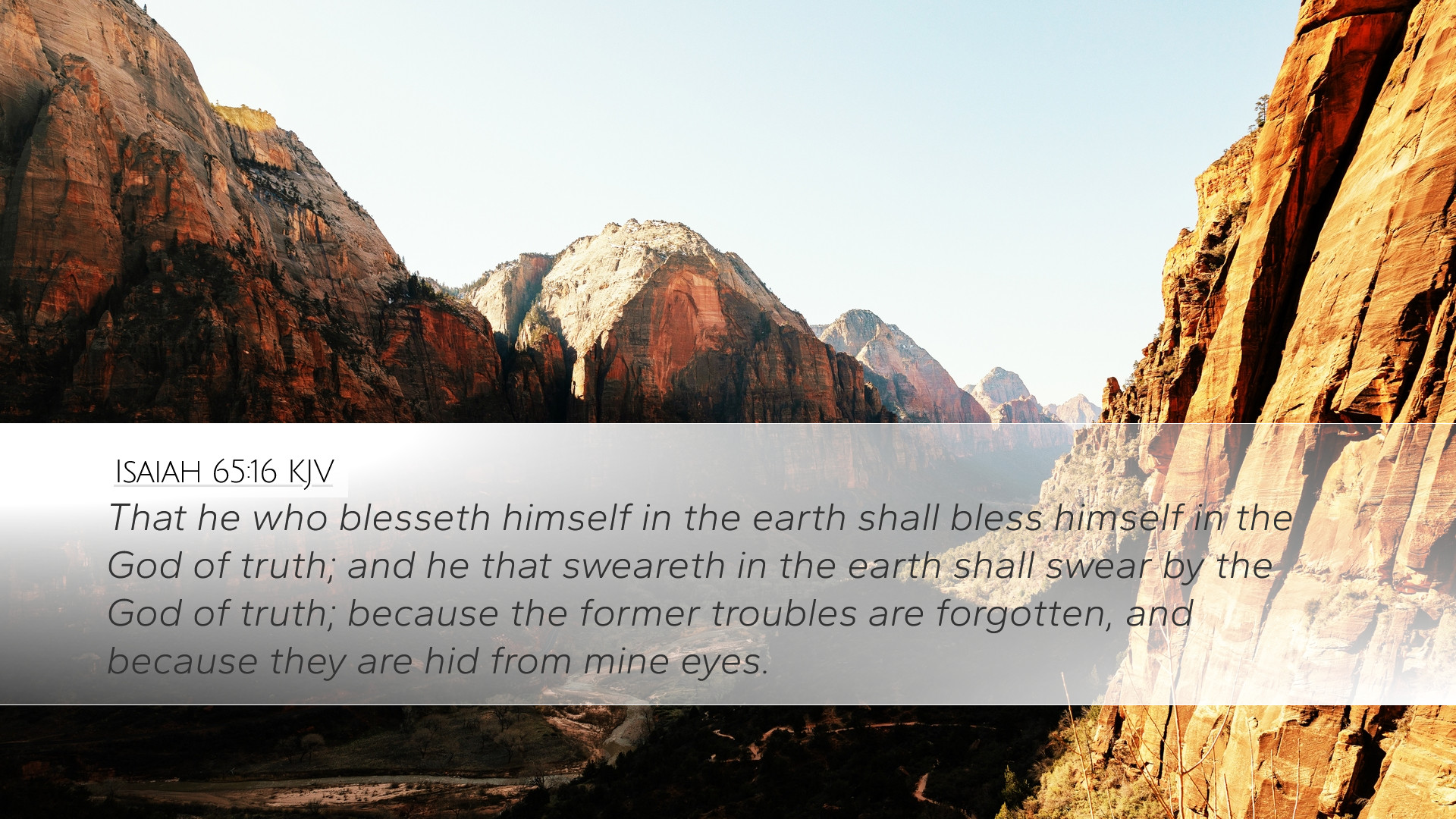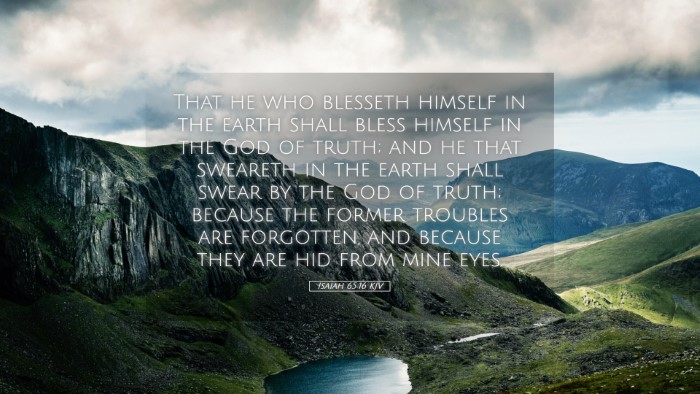Commentary on Isaiah 65:16
Isaiah 65:16 states:
"That he who blesseth himself in the earth shall bless himself in the God of truth; and he that sweareth in the earth shall swear by the God of truth; because the former troubles are forgotten, and because they are hid from mine eyes."
Introduction
This verse stands as a powerful declaration of the transformation that God promises to His people. It reflects themes of blessing, truth, and the renewal of relationships and circumstances in a restored creation. Commentators like Matthew Henry, Albert Barnes, and Adam Clarke provide insightful interpretations that delve into the meaning and implications of this verse.
The Significance of Blessing in the Earth
Matthew Henry emphasizes that the act of blessing carries profound significance in biblical tradition. In this context, to bless oneself in the earth implies recognizing the source of blessings—namely, God Himself. The call to "bless himself in the God of truth" suggests a deep spiritual acknowledgment of God's sovereignty and faithfulness.
Albert Barnes elaborates on this point by highlighting the contrast between earthly blessings and the ultimate blessing found in God. He suggests that true prosperity must be rooted in a relationship with the Almighty, especially in a time when former troubles and sorrows are overshadowed by divine mercy and grace.
The God of Truth
The reference to “the God of truth” in this verse is particularly notable. Adam Clarke points out that calling God 'truth' implies His reliability and faithfulness. In a world filled with deception and uncertainty, the assurance that God is the ultimate source of truth is a profound comfort to believers. Clarke argues that this truthfulness of God enables His followers to trust in His promises and blessings.
Moreover, Matthew Henry suggests that recognizing God as the God of truth leads to a righteous transformation amongst His people. They are called to live by His standards, embracing His truth in their lives, which in turn alters how they approach their circumstances.
The Context of Suffering and Renewal
Understanding the broader context of Isaiah 65 is essential to grasp the full weight of this verse. Albert Barnes highlights that this passage comes after a lengthy description of the judgment and suffering faced by Israel due to their disobedience. However, there is a pivotal shift where God promises redemption and restoration, ensuring that past troubles will be 'forgotten' and 'hid from mine eyes.'
This promise reflects a new era where former grievances do not overshadow the joy of relationship with God. Matthew Henry notes that this indicates a total and complete forgiveness—a theme echoed in the New Testament through the lens of Christ’s redemptive work.
The Importance of Covenant and Oath
Isaiah 65:16 also touches on the theme of oaths. The phrase “he that sweareth in the earth shall swear by the God of truth” indicates a return to the proper reverence and acknowledgment of God in important commitments. Adam Clarke explains that swearing by God reinforces the sacredness of promises and covenants.
This practice, aligned with the character of God as truthful and faithful, encourages believers to adhere to truth in their dealings and to invoke God's name with reverence. The change in how oaths are made signifies an alignment of human practice with divine truth.
Hope for the Future
Central to this verse is the hope that accompanies God's presence. Matthew Henry explains that the former troubles mentioned are not merely wiped away by forgetfulness but are overshadowed by a new hope. The transformative power of God's intervention assures believers that their pains will be eclipsed by the joy of His restoration.
Albert Barnes illustrates this by noting that true blessing comes when individuals recognize and acknowledge God's work in their lives. The promise of a renewed future filled with peace is a profound theme echoed throughout Isaiah and reinforced in the New Testament.
Conclusion
Isaiah 65:16 encapsulates a rich theology of blessing, truth, and hope in the believer's life. The insights of Matthew Henry, Albert Barnes, and Adam Clarke reveal layers of meaning in this verse, underscoring the transformation promised by God. For pastors, students, theologians, and Bible scholars, this passage serves as a reminder of the integral relationship between God and His people—one characterized by truth, faithfulness, and renewal.
As one contemplates the implications of this verse, it is essential to consider how it calls us to bless ourselves in God, embrace His truth, and anticipate the hopeful future He has promised, free from the burdens of the past.


